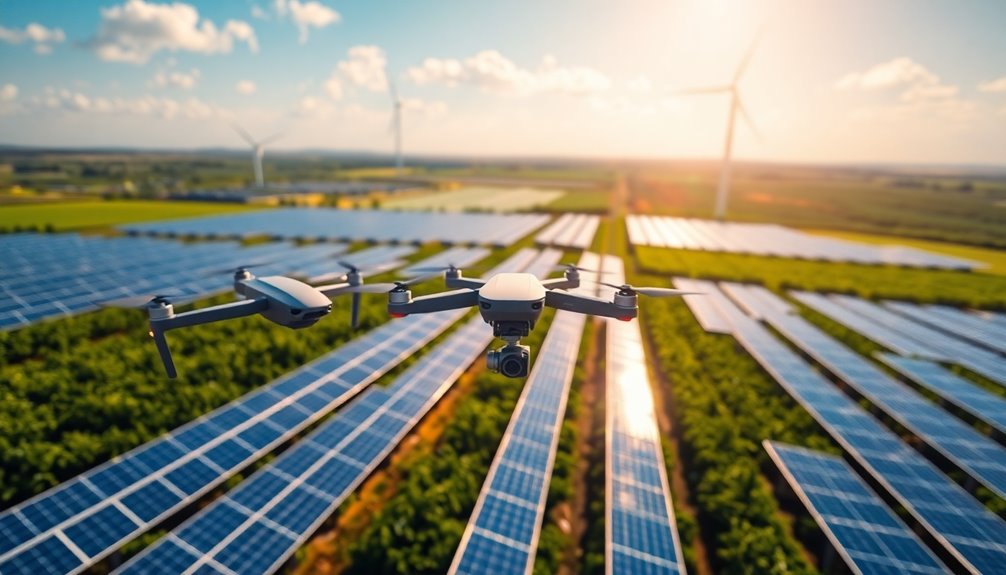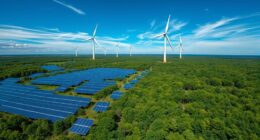AI is transforming sustainability by optimizing energy use, enhancing agriculture, and reducing waste. It analyzes data to boost crop yields while cutting resource waste and streamlines supply chains to prevent overproduction. AI algorithms also improve recycling efficiency and monitor climate trends, predicting extreme weather and air quality issues. With these advances, you can see how AI supports a greener future and enables smarter decision-making. There's plenty more to discover about AI's role in sustainable practices.
Key Takeaways
- AI enhances energy management by analyzing data to optimize usage, reduce expenses, and minimize carbon footprints.
- In agriculture, AI technologies increase crop yields while conserving resources through precision farming and real-time monitoring.
- AI tools in waste reduction identify production inefficiencies, align outputs with demand, and streamline recycling processes.
- Sustainable supply chain optimization is achieved through AI, improving inventory management and enhancing supplier collaboration using real-time data.
- AI-driven climate monitoring predicts weather events and analyzes climate data, supporting effective resource allocation and informed climate action strategies.
AI in Energy Management
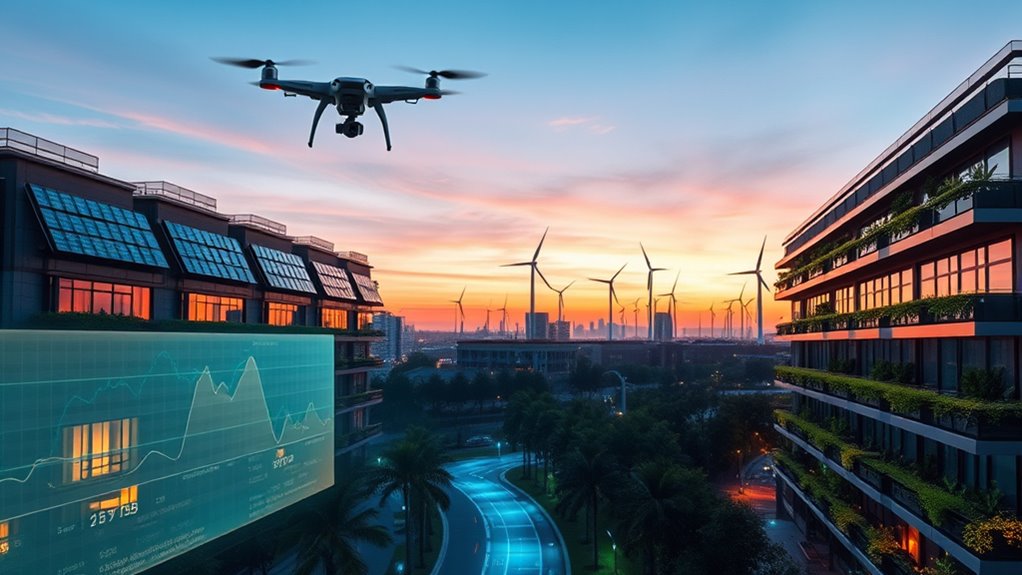
As you explore the intersection of AI and energy management, you'll find innovative solutions that optimize energy consumption and reduce costs.
AI algorithms analyze data from smart meters and IoT devices, helping you pinpoint inefficiencies in real-time. By adjusting energy usage patterns, you not only cut expenses but also minimize your carbon footprint.
Predictive analytics can forecast energy demand, allowing you to make informed decisions about resource allocation. Additionally, AI-driven systems can automate energy distribution, ensuring that renewable sources are utilized effectively.
Implementing these technologies empowers you to create a sustainable energy strategy tailored to your needs. Embracing AI in energy management leads to smarter consumption, lower bills, and a significant positive impact on the environment.
Smart Agriculture Solutions
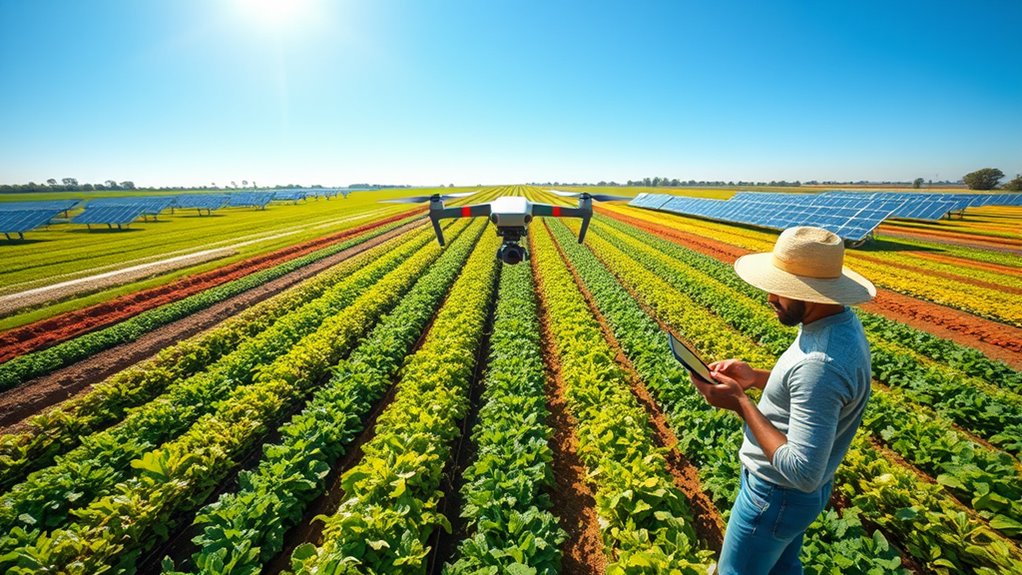
Energy management isn't the only area where AI is making a significant impact; smart agriculture solutions are transforming the way we grow food.
By using AI-driven technologies, you can optimize crop yields while reducing resource waste. For instance, precision farming tools analyze soil health and weather patterns, enabling you to make informed decisions about irrigation and fertilizer use.
Leverage AI-driven technologies to enhance crop yields and minimize resource waste through precision farming insights.
Drones and sensors monitor crop conditions in real-time, helping you catch issues early and respond promptly. Additionally, AI algorithms can predict pest outbreaks, allowing you to implement targeted treatments that minimize chemical use.
With these advancements, you not only enhance productivity but also promote sustainable practices. Embracing smart agriculture solutions means you're contributing to a healthier planet and ensuring food security for future generations.
Waste Reduction Through AI

While many industries grapple with waste management, AI offers innovative solutions that significantly reduce waste across various sectors.
You can leverage AI tools to analyze data and identify inefficiencies in production processes, helping you minimize excess materials and energy consumption. For example, AI algorithms can predict demand more accurately, ensuring you produce only what's needed, reducing overstock and waste.
Additionally, AI-powered systems can optimize recycling processes, sorting materials more efficiently than humans can. By implementing these technologies, you not only enhance your operational efficiency but also contribute to a more sustainable future.
Embracing AI for waste reduction empowers you to make smarter decisions, ultimately leading to a cleaner environment and lower operational costs.
Sustainable Supply Chain Optimization

To achieve a truly sustainable supply chain, companies must integrate AI technologies that streamline processes and enhance transparency.
By leveraging AI, you can optimize inventory management, reduce waste, and improve demand forecasting. Predictive analytics can help you anticipate customer needs, ensuring that you produce only what's necessary. This not only cuts costs but also minimizes excess production and resource consumption.
Leverage AI to optimize inventory, cut costs, and minimize waste through enhanced demand forecasting and predictive analytics.
AI can also enhance supplier collaboration, allowing for real-time data sharing and communication. When you embrace automated systems for tracking shipments and materials, you increase efficiency and reduce your carbon footprint.
Ultimately, investing in AI for supply chain optimization can lead to a more resilient, sustainable operation that meets both your business goals and environmental responsibilities.
AI-Powered Climate Monitoring and Prediction
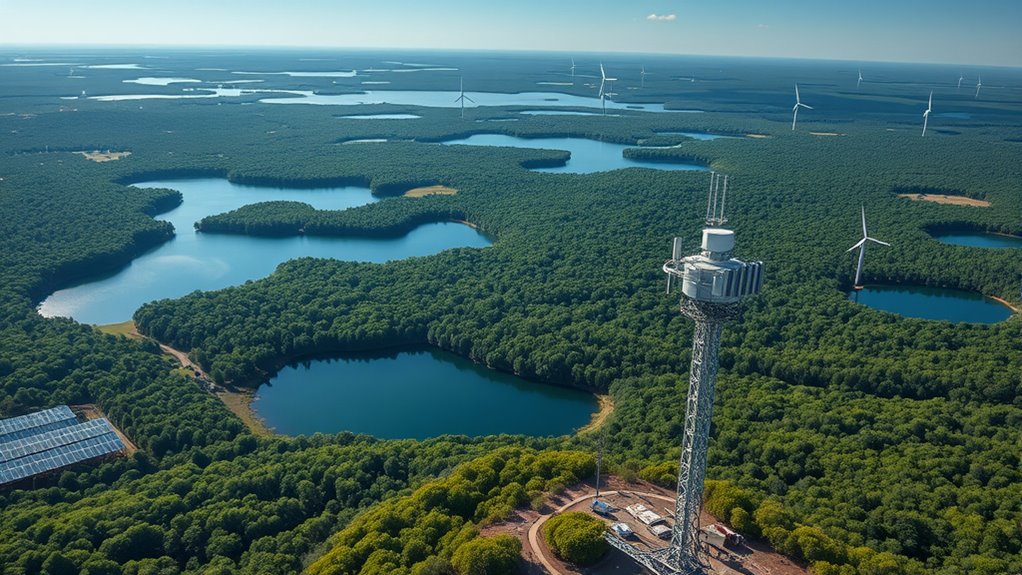
As climate change accelerates, leveraging AI for climate monitoring and prediction becomes essential for understanding and mitigating its impacts.
You can harness AI algorithms to analyze vast amounts of climate data, from satellite imagery to weather patterns. This technology helps you identify trends and make accurate predictions about extreme weather events, like hurricanes and floods.
Additionally, AI can optimize resource allocation for disaster response, ensuring timely interventions. By integrating real-time data sources, you can enhance models that forecast air quality and greenhouse gas emissions.
This proactive approach empowers communities and governments to implement effective climate action strategies. Ultimately, AI-driven insights enable you to make informed decisions, fostering resilience in the face of climate challenges.
Frequently Asked Questions
How Does AI Impact Local Economies in Sustainability Efforts?
AI impacts local economies by enhancing efficiency and reducing costs.
You see businesses optimizing their operations, leading to higher productivity. With data-driven insights, local farmers can improve crop yields, while small manufacturers can streamline supply chains.
These advancements often create jobs and encourage innovation, helping communities thrive. As you engage with AI technologies, you're likely to notice a more sustainable approach to resource management, benefiting both the environment and local economic health.
What Are the Ethical Considerations of AI in Sustainability?
When you consider the ethical implications of AI, you've got to think about transparency, bias, and accountability.
You want to ensure that AI systems don't perpetuate existing inequalities or harm vulnerable communities. It's crucial to involve diverse stakeholders in the development process.
Also, you've got to address the potential for job displacement and ensure that the benefits of AI are shared fairly, rather than concentrated in a few hands.
How Can Individuals Use AI for Personal Sustainability?
Think of AI as your personal compass, guiding you toward sustainable choices.
You can use AI tools to track your energy consumption, optimize your recycling habits, and plan eco-friendly meals.
By utilizing apps that analyze your carbon footprint, you'll make informed decisions that benefit both you and the planet.
Embrace AI's capabilities to suggest local sustainable products and services, helping you weave eco-consciousness into your everyday life seamlessly.
What Are the Limitations of AI in Sustainability Applications?
AI has its limitations in sustainability applications. It often relies on data that's incomplete or biased, which can skew results.
You might encounter challenges with scalability, as not all AI solutions can be applied universally. Additionally, there's a risk of over-reliance on technology, leading to a lack of human oversight.
Lastly, implementing AI can require significant resources and expertise, which not everyone has access to, limiting its widespread effectiveness.
How Is AI Influencing Environmental Policy Decisions?
AI's influencing environmental policy decisions by providing data-driven insights that help you understand complex environmental issues.
It analyzes vast amounts of data, predicting trends and outcomes that shape policies. With AI, you can assess the effectiveness of existing regulations and identify areas needing improvement.
It also aids in public engagement, offering clear, accessible information that empowers communities to advocate for sustainable practices.
Conclusion
In a world where every small action counts, you're part of a larger narrative, much like the heroes in a classic tale fighting for a brighter future. By embracing AI for sustainability, you're not just optimizing energy or reducing waste; you're weaving a greener tapestry for generations to come. With each smart decision, you're echoing the call of Mother Earth, proving that technology and nature can dance in harmony. Together, let's turn the tide toward a sustainable tomorrow.
